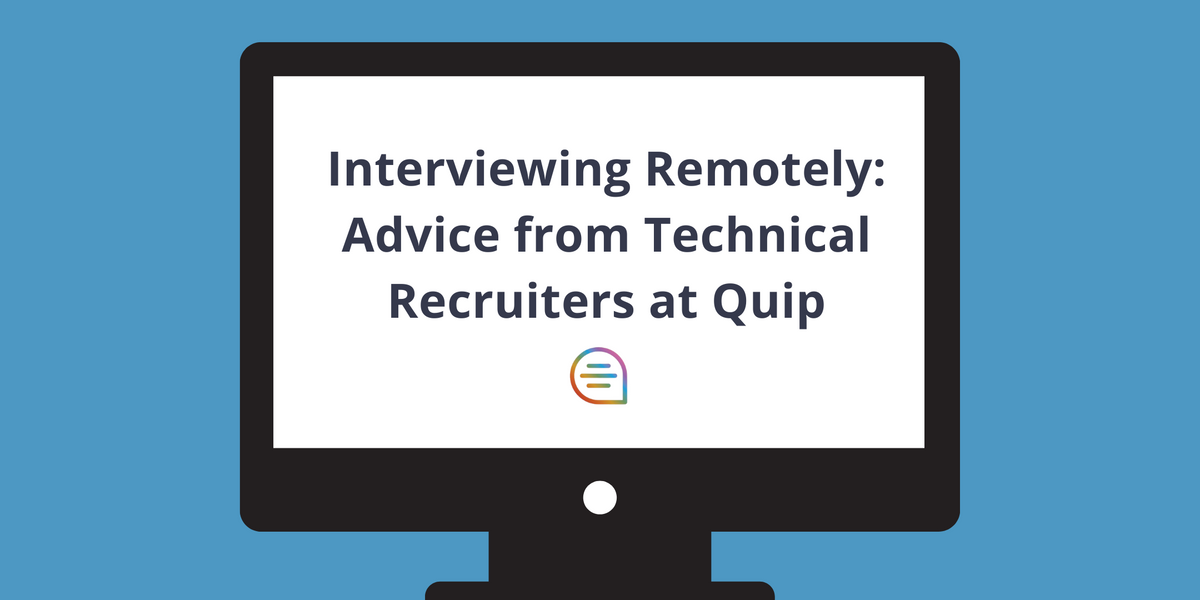The pandemic's impact on collaborative software company Quip's technical recruiting team started slowly.
First, their roster of engineering interviewers started to dwindle as rising concerns about COVID-19 led some of them to start working from home in January and February, remembers technical recruiter Grace Kim. "We needed to rethink how we conducted our onsite interviews with a limited pool," she says.
Then, things came to a head in early March, when Quip—and their parent company Salesforce—went fully remote.
Alan Leung, Quip's senior manager of technical recruiting, was in Tahoe with his wife and two friends when he got the news. "We talked through our emotions, how anxious we felt, what we needed to stock up on, and what it would mean to be and feel safe this year," he says. "And then the recruiting team immediately communicated the news to our active candidates."
The rush to move onsite interviews online, cancel travel confirmations, and keep candidates informed throughout the process was a scramble, and Alan credits Quip's dedicated recruiting coordinator for finding a way of making it all happen.
But that was just the start of the challenges and adaptations Alan's team was headed towards.
During these last nine months, Quip's technical recruiting team has had to redesign itself and its workflows over and over again. First, they created an all-remote hiring process. Then, when hiring slowed down as the business determined its changing headcount needs, they figured out how to pause that process while preserving candidate experience. Later, they ramped hiring back up again to meet growing demand. And through it all, they invested in bettering their processes, like by cleaning up their data and stepping up their blog game, and in deepening their bench of skills, going so far as to lend their team members out to other business-critical projects.
Along the way, their recruiting team has figured out how to be an agile, adaptable team—and also gotten an up-close, expert look at what the future of virtual technical recruiting looks like. Here, we've gathered their top tips for technical interviewees so that candidates can benefit from their hard-earned knowledge.
9 tips from Quip's technical recruiters on having a good remote technical interview
1. Use your network. If you're eyeing a role at a specific company, go ahead and see if you know anyone who can help make an introduction, says Quip technical recruiter Stephen Gavney. "Referrals can be such a powerful tool, so if you know someone who knows someone at a company you are interested in...use them!"
Tooba Qadri, a Quip senior technical recruiter, agrees, and notes that it's a good idea to be networking even if your dream company doesn't have any open roles listed. "Even if a company you like isn't hiring right now, still connect with people there—you never know when a position might open up," she says.
2. Ask for what you need. Tooba highlighted the fact that Quip is offering to set up interviews over several days so that candidates can more easily balance the load (and the resultant Zoom fatigue). "We understand that lots of people currently have other things going on in their personal lives so it's hard for them to do back-to-back interviewing," she says, noting that the scheduling process is a good way to see if the company has a flexible approach to work-life balance.
3. Triple-check your setup. Alan suggests making sure your computer is fully updated several days before the interview so that no last-minute software updates derail you on the day of. He also recommends an external camera if you have one, since they provide better image quality, and plugged-in headphones versus wireless ones in case your connection drops.
4. Look sharp. "Even though we might not be in the office, still dress like you are going into the interview," reminds Tooba. Check with your recruiter ahead of time if the company has a specific dress code, and even if they say they're casual, don't show up in a t-shirt. Aim for a nice sweater or blouse instead.
5. Consider your body language. "There's no more firm handshake!" says Tooba. Instead, she recommends conveying confidence through direct eye contact.
6. Continue to ask questions. "Especially about how remote life has been for the people at the company," suggests Tooba. "Seeing what other people have to say will give you an idea into the company life and it will show that you are curious to learn more. Remember, even if we are interviewing you for the role, you should also be interviewing us to make sure it's a good fit!"
Alan notes that interviewees should be especially prepared for virtual interviews and come with meaningful questions. "Show that you have a thorough understanding of the company's mission, values, and culture and be prepared to speak to how your experience aligns with the team's goals," he says.
7. Take advantage of your surroundings. "While virtual interviewing does have its limitations, it also has its unique opportunities!" says Grace. "Feel free to pepper your screen with notes or prompts that you can refer to occasionally when you need a quick reminder, as long as it doesn't look like you're reading verbatim." If you're using your phone as a notes screen or timer, though, make sure you have the sound off, notes Alan.
8. Say thank you. Many candidates will send a thank-you email or card to their interviewers. But Stephen says that a note to your recruiter would be welcome, too! "I have gotten a couple of thank yous and it is really reassuring that the candidate knows and is appreciative of all your work behind the scenes," he says. Grace thinks you can get even more creative: "One of my coworkers received a cute cat photo from a candidate. I will never say no to receiving cute animal pics!"
9. Stay resilient. It's a tough job market, and not every interview will go well. Alan notes how important it is to find a way through it: "During these times, it's even easier to feel discouraged and unmotivated when you get a decline or a reject. Find ways that you can practice staying resilient, whether it be working out, meditating, crafting, or gratitude journaling. Figure out what works for you and stay true towards that purpose."
If you're interested in putting your technical interviewing skills to the test at Quip, check out their open roles and learn more about their company values here.




